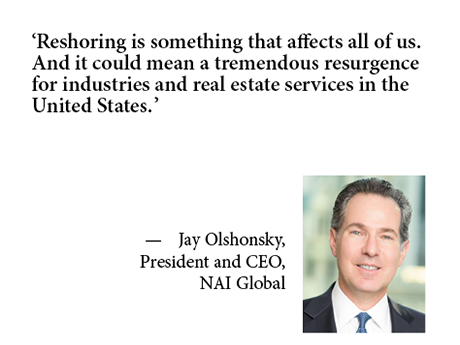As economic uncertainty remains at the forefront, there is a continued quest to combat the multitude of challenges encountered by the manufacturing industry, as well as the trickle-down effects on commercial real estate markets. At the recent NAI Global Convention in Las Vegas, NAI Global president and CEO, Jay Olshonsky sat down with an industry leader who has spent the last decade mitigating these complexities.
“It’s a very clear mission, to balance the goods trade deficit, the difference between imports and exports,” said Harry Moser, who founded the Reshoring Initiative in 2010 to bring manufacturing jobs back to the United States. “The deficit last year was $1.2 trillion and balancing that and bringing those jobs back at current levels of U.S. productivity will increase U.S. manufacturing by six million jobs, or about 40 percent.”

The emphasis on reshoring is driven by a variety of factors, for example, rising labor costs in foreign countries and corporate understanding of the total cost of offshoring — including intellectual property theft, freight and tariffs. Companies desire greater control over supply chains, especially in a time of rising geo-political tension. By promoting a contained, local approach across the entirety of the manufacturing landscape, industry leaders can minimize disruptions, cut costs and enhance oversight.
In 2022, the Reshoring Initiative announced that over 350,000 manufacturing jobs returned to the United States, a number that has continued to rise as a result of growing complexities throughout import supply chains. These problems can be attributed to material shortages at suppliers and to capacity issues, as well as logistics problems caused by the pandemic. Disruptions, for example, those due to COVID, the holdups in the Suez Canal and Russia/Ukraine war, are motivating companies to insure their supply lines by additional reshoring.
Moser highlighted the diverse beneficiaries of reshoring and the effects of its continued growth and establishment amongst domestic companies.
“From the country’s viewpoint, the multiplier effect for manufacturing is about the highest of any of the categories. If you have a given amount of space and you can put something in it, you’re going to benefit your community or country more if you put in a manufacturing plant than if you put in a distribution center or retail,” added Moser.
“Reshoring is something that affects all of us,” explains Olshonsky. “And it could mean a tremendous resurgence for industries and real estate services in the United States.”
Moser explains that most of the actionable aspects required to achieve reshoring, and to balance the trade deficit, are things like competitiveness, productivity, education, training and innovation, which will ultimately create a stronger and safer United States for future generations.
Going to Need a Bigger Boat
This “multiplier effect” that Moser mentions, speaks to the economic, real estate and migration effects stemming from reshoring. The influx of new jobs and economic resources will further bolster local tourism and commercial and residential real estate value and developments.
Reshoring’s principles are contingent on an expansion in U.S. manufacturing, and with that comes the need for additional resources, both in manufacturing materials as well as in sheer factory space and distribution centers. As these additional resources become more prevalent, U.S. manufacturers will look to the CRE market to fulfill their production and storage requirements.
For investors and CRE brokerages alike, reshoring’s gradual increase and legitimacy provide a boost of opportunity for those looking to explore the industrial markets as well as land deals and new developments. Commercial real estate service organizations can assist with reshoring efforts by providing companies and individuals with access to local market expertise and real estate services to identify suitable properties and negotiate favorable lease or purchase terms. Additionally, brokerages can provide companies with insights into local regulations, labor markets and other factors that may impact the success of reshoring efforts. The Reshoring Initiative provides tools to help companies quantify the benefits of reshoring.
— By Sam Felton. This article was written in conjunction with NAI Global, a content partner of REBusinessOnline. For more articles from and news about NAI Global, click here.


